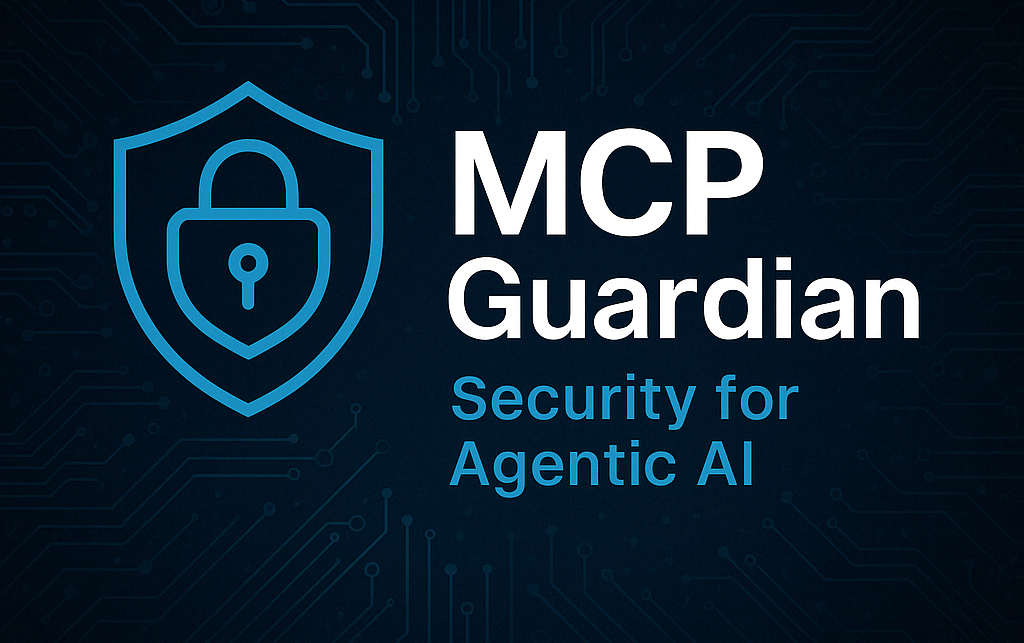Agentic AI that can autonomously call databases, operating‑system shells, web APIs, and custom tools are no longer science fiction—they’re shipping to production every day.
The Model Context Protocol (MCP) has emerged as the de‑facto interface that lets large language models (LLMs) invoke those tools at scale. Yet with great power comes great risk: command injection, tool spoofing, API key theft, and other attack vectors can turn an LLM into a super‑charged threat actor.
Enter MCP Guardian—a lightweight, security‑first middleware that wraps every MCP tool invocation with defense‑in‑depth controls, without slowing developers down. Below, we unpack the research, design choices, and performance results that make MCP Guardian a must‑have seatbelt for Agentic AI.
Table of Contents
Why We Needed a “Guardian”
LLMs can chain together calls to any tool described in the MCP manifest. That flexibility is a double‑edged sword:
| Threat Vector | Real‑World Impact |
|---|---|
| Tool Poisoning | Hidden instructions embedded in tool descriptions trigger malicious actions. |
| Tool Name Spoofing | mcp‑weather vs. weather‑mcp—easy to trick an LLM into the rogue version. |
| Shadowing / Overwrites | A hijacked tool redefines trusted behavior at runtime. |
| Command Injection | Prompts inject rm ‑rf / or destructive SQL queries. |
| Rug Pulls & OAuth Theft | Compromised tokens silently exfiltrate data or invoke paid APIs. |
Traditional WAFs and API gateways don’t understand MCP’s semantics, and agent frameworks rarely ship with robust security defaults. MCP Guardian closes that gap.
How MCP Guardian Works
| Control | Purpose & Security Benefit |
|---|---|
| Token Authentication | Rejects any request lacking a valid, scoped API token—establishing a Zero‑Trust baseline. |
| Rate Limiting | Enforces per‑tool and per‑user quotas to stop brute‑force and DoS attacks. |
| Regex‑Based WAF Scan | Blocks dangerous patterns (e.g., shell commands, SQLi) before execution, shielding the system. |
| Logging & Tracing | Streams detailed audit logs locally or via OpenTelemetry for complete observability. |
| Minimal Latency Overhead | Adds only ≈ 3 ms per call—delivering security without sacrificing performance. |
Performance & Evaluation
- 3–4 ms median latency overhead
- Sustained 100+ requests/sec without throttling on commodity hardware
- WAF blocked all simulated
rm ‑rf /, SQLi, and prompt‑injection attacks - Zero valid‑token false positives
Fit for Modern MLOps & CI/CD
- Python package, plug‑and‑play
- Role‑based access, token expiry & scoping out‑of‑the‑box
- Realtime alerts to Slack/Discord or SIEM
- Compatible with mcpo (MCP‑to‑OpenAPI proxy) for RESTful exposure
Roadmap: Security That Evolves
| Future Feature | Purpose |
|---|---|
| Signed Tools & Verified Registries | Supply‑chain integrity |
| Policy‑as‑Code | Live rule updates without redeploys |
| ML‑Based Anomaly Detection | Catch novel threats in real time |
Conclusion
MCP unleashed unprecedented autonomy for LLMs; MCP Guardian ensures that autonomy doesn’t compromise security. Whether you’re building a hackathon prototype or an enterprise‑grade agent platform, Guardian delivers:
- Auth & rate limits
- Regex WAF
- Full logging & alerts
- Future‑proof extensibility
- Negligible performance hit
Cite our paper at: arXiv:2504.12757 [cs.CR]

